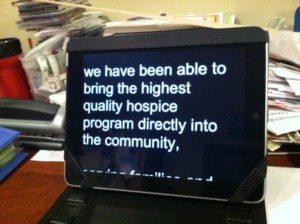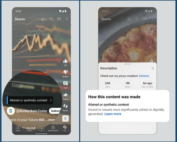Here’s part 3 of our common interview concerns series, this time, offering video interview tips concerning communicating your best message.
 There are a lot of things to consider when you prepare to be interviewed for a video production, but one of the biggest concerns among first-time interviewees is the question, “What will I say?” When you’re dealing with professional video producers, they’ve already seen all levels of camera-readiness, and they should be able to put most of your fears at ease, but you can help prepare yourself, too. Here’s a great technique we used recently: we turned an iPad into a teleprompter. There are a bunch of apps that will do this; we used dv prompter and it worked like a dream. While our interviewee was very articulate, a teleprompter allowed us to create a concise, crisp final statement.
There are a lot of things to consider when you prepare to be interviewed for a video production, but one of the biggest concerns among first-time interviewees is the question, “What will I say?” When you’re dealing with professional video producers, they’ve already seen all levels of camera-readiness, and they should be able to put most of your fears at ease, but you can help prepare yourself, too. Here’s a great technique we used recently: we turned an iPad into a teleprompter. There are a bunch of apps that will do this; we used dv prompter and it worked like a dream. While our interviewee was very articulate, a teleprompter allowed us to create a concise, crisp final statement.
You won’t want to use a teleprompter for your entire interview, however. Here are some video interview tips:
- Know the key messages that you and your organization want to convey in the video well. Be comfortable expressing these key messages both in short, concise statements and through a (short) anecdote or two.
- Ask to preview the interview topics to get a general idea of what the interviewer wants. (But try to memorize answers to specific questions–we’ve often seen people frustrated when they don’t remember a favorite phrase, and it does come off as less natural.)
- Even when the cameras are rolling, don’t be afraid to pause and think before answering a question. Taking a second before responding gives you time to collect your thoughts and avoid a long pause in an otherwise great clip. (Some pauses can be cut out and covered with footage of other relevant scenes.)
- Repeating the question as the start of your response is also useful for framing your response so that it can be used flexibly by the video editor. For example, if you’re asked, “What is your favorite color?” don’t reply with “orange” or even “It’s orange.” Reply with “My favorite color is orange.” The editor of your video can’t do much with a random clip of someone saying the word “orange!”
- Avoid unfamiliar acronyms and jargon that your audience may not recognize. It’s easy to forget that not everyone knows the words you use all the time.
The most important thing you can do when speaking in an interview is to be natural. The whole reason we do interviews is so that the audience can see the real person talking about their passion, career, and expertise. Thus, you need to be the real person. That’s why scripts and memorization are discouraged. Rehearsed lines often sound…rehearsed.
But again, a professional is going to tell you these things and put you at ease. Remember, it’s our job (not to mention, our passion) to help you communicate successfully in your interview.
If MiniMatters can help you with fundraising video, association video, or other video production needs, we’d love to talk with you at 301-339-0339 or via email at [email protected]. We serve associations, foundations, and businesses primarily in Washington, DC, Maryland, and northern Virginia.



